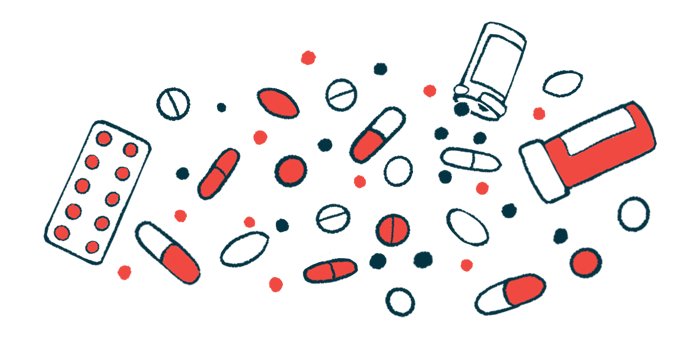Patients able to reduce supportive therapies after starting Trikafta
Standard-of-care therapies discontinued with aid of de-escalation algorithm
Written by |

Reducing the use of supportive therapies after starting Trikafta (elexacaftor/tezacaftor/ivacaftor) didn’t negatively impact health outcomes among cystic fibrosis (CF) patients, according to a recent study.
Guided by a de-escalation algorithm for safely stopping supportive therapies, patients were able to cut back on such treatments by 50% on average, while still seeing the lung function gains and other clinical improvements typically associated with Trikafta.
“Standard-of-care CF therapies may be able to be discontinued within the context of a de-escalation algorithm while maintaining pulmonary stability,” the researchers wrote in “Impact of chronic medication de-escalation in patients with cystic fibrosis taking elexacaftor, tezacaftor, ivacaftor: A retrospective review,” which was published in the Journal of Cystic Fibrosis. “These results support moving toward decreased medication burden and cost as well as increased quality of life.”
CFTR modulator therapies target the cause of CF by improving the function of the faulty CFTR protein that drives the disease’s symptoms. Before their emergence, managing CF relied largely on supportive treatments such as antibiotics and inhaled therapies to help keep symptoms under control.
Vertex Pharmaceuticals‘ Trikafta, the most newly approved CFTR modulator, is considered a highly effective therapy for patients with at least one copy of F508del — the most common CF-causing mutation — or rarer mutations responsive to the therapy on lab studies. For this reason, patients who achieve sufficient disease control with it may wish to discontinue other supportive therapies. Abruptly stopping those treatments may not be safe or could cause symptoms to re-emerge.
To avoid this, researchers at Nationwide Children’s Hospital in Ohio developed a de-escalation algorithm to wean patients off other therapies after they achieve stable clinical improvements with Trikafta.
Decreasing supportive therapy use with Trikafta
In this study, the researchers retrospectively reviewed data from that program to evaluate the safety and efficacy of Trikafta while supportive therapies were being de-escalated in accordance with the algorithm.
Included were patients who started Trikafta at Nationwide Children’s Hospital between September 2019 and December 2020 as part of a compassionate use program before its approval.
Of 174 patients with a mean age of 24 upon starting Trikafta, 139 de-escalated at least one supportive therapy. Of those, 65% entirely adhered to the de-escalation algorithm.
Lung function significantly improved after a month on Trikafta and remained stable for up to a year after starting the therapy, regardless of de-escalating other therapies.
During that first year of treatment, patients were able to decrease the number of supportive therapies they were using by 50%. At the time Trikafta was started (baseline), the patients were using a median of two supportive therapies, which was reduced to one after a year. The use of inhaled therapies was reduced from a median of three daily doses at baseline to one daily dose after a year.
The most frequently de-escalated therapy was Pulmozyme (dornase alfa), a mucus-thinning agent. Other commonly de-escalated treatments included hypertonic saline and antibiotics such as tobramycin, aztreonam, azithromycin, colistin, and minocycline.
Consistent with previous data, Trikafta was also associated with an increase in body mass index (a measure of body fat), reductions in sweat chloride levels (a way to assess CFTR protein function), fewer Pseudomonas aeruginosa infections, and fewer hospitalizations, regardless of supportive therapy de-escalation.
The reduction in observed P. aeruginosa infections was a significant contributor to de-escalating antibiotic therapies, the researchers noted.
Stopping supportive therapies also has a financial benefit, they said. For example, tobramycin, an antibiotic, was discontinued in 42 people, saving the healthcare system an estimated $120,000 yearly per patient.
The findings indicate “de-escalating supportive therapies can be done safely,” while also allowing for “decreased costs and more resources for other patients,” the researchers wrote, adding more research should be conducted to “investigate [the] effects of long-term de-escalation.”







